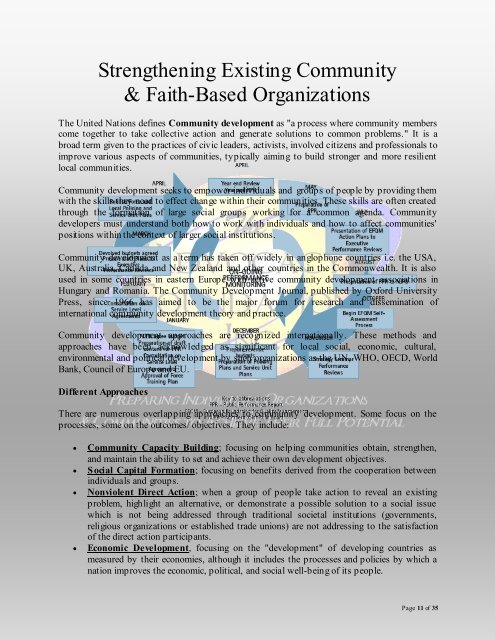The Community Engagement Strategy
The Community Engagement Strategy
The Community Engagement Strategy
Create successful ePaper yourself
Turn your PDF publications into a flip-book with our unique Google optimized e-Paper software.
Strengthening Existing <strong>Community</strong><br />
& Faith-Based Organizations<br />
<strong>The</strong> United Nations defines <strong>Community</strong> development as "a process where community members<br />
come together to take collective action and generate solutions to common problems." It is a<br />
broad term given to the practices of civic leaders, activists, involved citizens and professionals to<br />
improve various aspects of communities, typically aiming to build stronger and more resilient<br />
local communities.<br />
<strong>Community</strong> development seeks to empower individuals and groups of people by providing them<br />
with the skills they need to effect change within their communities. <strong>The</strong>se skills are often created<br />
through the formation of large social groups working for a common agenda. <strong>Community</strong><br />
developers must understand both how to work with individuals and how to affect communities'<br />
positions within the context of larger social institutions.<br />
<strong>Community</strong> development as a term has taken off widely in anglophone countries i.e. the USA,<br />
UK, Australia, Canada and New Zealand and other countries in the Commonwealth. It is also<br />
used in some countries in eastern Europe with active community development associations in<br />
Hungary and Romania. <strong>The</strong> <strong>Community</strong> Development Journal, published by Oxford University<br />
Press, since 1966 has aimed to be the major forum for research and dissemination of<br />
international community development theory and practice.<br />
<strong>Community</strong> development approaches are recognized internationally. <strong>The</strong>se methods and<br />
approaches have been acknowledged as significant for local social, economic, cultural,<br />
environmental and political development by such organizations as the UN, WHO, OECD, World<br />
Bank, Council of Europe and EU.<br />
Different Approaches<br />
<strong>The</strong>re are numerous overlapping approaches to community development. Some focus on the<br />
processes, some on the outcomes/ objectives. <strong>The</strong>y include:<br />
<br />
<br />
<br />
<br />
<strong>Community</strong> Capacity Building; focusing on helping communities obtain, strengthen,<br />
and maintain the ability to set and achieve their own development objectives.<br />
Social Capital Formation; focusing on benefits derived from the cooperation between<br />
individuals and groups.<br />
Nonviolent Direct Action; when a group of people take action to reveal an existing<br />
problem, highlight an alternative, or demonstrate a possible solution to a social issue<br />
which is not being addressed through traditional societal institutions (governments,<br />
religious organizations or established trade unions) are not addressing to the satisfaction<br />
of the direct action participants.<br />
Economic Development, focusing on the "development" of developing countries as<br />
measured by their economies, although it includes the processes and policies by which a<br />
nation improves the economic, political, and social well-being of its people.<br />
Page 11 of 35

















